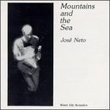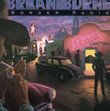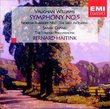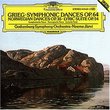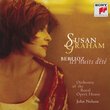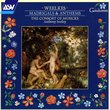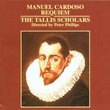| All Artists: George Whitefield Chadwick, Theodore Kuchar, Ukraine State Radio Symphony Orchestra Title: Chadwick: Symphony No. 2; Symphonic Sketches Members Wishing: 0 Total Copies: 0 Label: Naxos American Release Date: 4/19/2005 Genre: Classical Style: Symphonies Number of Discs: 1 SwapaCD Credits: 1 UPC: 636943921326 |
Search - George Whitefield Chadwick, Theodore Kuchar, Ukraine State Radio Symphony Orchestra :: Chadwick: Symphony No. 2; Symphonic Sketches
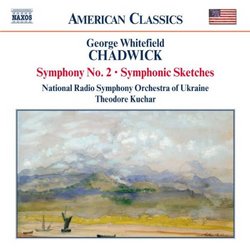 | George Whitefield Chadwick, Theodore Kuchar, Ukraine State Radio Symphony Orchestra Chadwick: Symphony No. 2; Symphonic Sketches Genre: Classical
|
Larger Image |
CD DetailsSimilar CDs
Similarly Requested CDs
|
CD ReviewsA Minor Master Is Finally Getting His Due M. C. Passarella | Lawrenceville, GA | 07/25/2005 (4 out of 5 stars) "It's good to see the music of George Whitfield Chadwick given its due increasingly. Naxos is doing its bit, with a fine recording of Chadwick tone poems from Kenneth Schermerhorn and the Nashville Symphony already in the stable. This new recording of the Second Symphony and Symphonic Sketches is almost as good, being let down by a rather distant recording that doesn't let brass and percussion ring through as they should. That said, the performance itself is first-rate. Kuchar and his band have shown their mettle in other American classics and near-classics, and I'd say they approach this music with as idiomatically as the Nashville orchestra does. But then again, the symphony sounds entirely European--kind of like Mendelssohn might have sounded if he had lived into the 1880s. Actually, the symphony sounds very much like music of a Mendelssohn devotee, Niels Gade. I wonder if Chadwick knew his music? No matter, this is charming, very appealing music in its own right, well argued, well put together and best of all, with memorable tunes. The notes to this recording say that Symphonic Sketches (a symphony in all but name) is Chadwick's orchestral masterpiece. Some might not agree, but one thing I will say: the first movement, "Jubilee," which is often heard in concert on its own, is probably the finest orchestral movement Chadwick wrote, maybe even the finest written by an American in the 19th century. It is Chadwick's "Carnival Overture," and like Dvorak's (which Chadwick must have known), it is basically festive in nature, but the rambunctiousness is balanced by moments of poignant nostalgia. "Jubilee" is in the form of a rondo, one of the recurring episodes providing the deep nostalgic strain that seems to look ahead to the music of the American stage--at least, it reminds me of Jerome Kern and his ilk. Thus it is very American music. In his thematic material at least, Chadwick cuts himself off from his European musical roots, and so Symphonic Sketches is important beyond its artistic merits alone. This is evident as well in Chadwick's "scherzo," entitled "Hobgoblin," and in his finale, which mimics the actions of a vaudevillian playing a stage hobo. Both these movements provide large slices of Americana. And both are entertaining, but it is "Jubilee" that is Chadwick's finest achievement. Certainly, I wish the recording had more presence and bite, but the performances are fine ones, and at Naxos' price, you can't go wrong. " Fine 19th-Century Romantic American Orchestral Works J Scott Morrison | Middlebury VT, USA | 04/21/2005 (4 out of 5 stars) "George Whitefield Chadwick (1854-1931) occupies a place in the history of American composition roughly similar to that of Stanford or Parry in Britain--honored in their time, teachers of composers whose acclaim eclipsed their own, and finally recovering some of their acclaim toward the end of the 20th century. Chadwick was a school dropout taught the basics of music by his brother. He financed his own trip to Leipzig to study under German masters, returning to the US to take up a place as one of America's most respected composers, teachers and administrators. After World War I his music dropped out of sight. The music on this issue has been recorded several other times in the past ten or fifteen years, in fine recordings conducted by Neeme Järvi and José Serebrier. The Järvi disc in particular, with the Detroit Symphony, is very good. This disc uses an orchestra from Eastern Europe and is conducted by an American of Ukrainian background, Theodore Kuchar. Good as it is, it is not nearly as suave as the Järvi set. Still, for the price it is rather a bargain; the performances are actually OK, it's just that there are marginally better recorded performances on Chandos. The booklet writer for this Naxos disc goes on and on about how the 'Symphonic Sketches' are perhaps Chadwick's masterpiece, and indeed they are much more 'American' than the more German-tinged Second Symphony. But for my taste the Symphony is the more satisfying work. It is unfailingly euphonious, conservative even for its time (except for the Scherzo which is actually rather advanced for 1888 and seems to foreshadow the much more familiar Dukas 'Sorcerer's Apprentice' rather like some of the music of George Templeton Strong written a few years later). 'Symphonic Sketches' is more nationalistic in that it uses American rhythms and folk-like tunes. It is expertly put together, has a rather open-faced, almost bumpkin-esque quality, and is charming in effect. I think the prospective buyer's choice is, rather, whether to spend full price for what I believe is a somewhat better set of performances or, because the music is unfamiliar and thus the buyer is taking a chance with it, to go for this super-budget CD. I think either choice is acceptable. Scott Morrison" Valuable Americana David Saemann | 12/19/2007 (4 out of 5 stars) "Chadwick is one of the great finds in the revival of American Romantic Music. The Symphonic Sketches in particular is a thrilling piece. This recording has much to recommend it. The Symphony seems underrehearsed, although the overall playing is vigorous and the interpretation is coherent. The violin playing is rather scrappy, but if you can put that aside, the performance is still enjoyable. The Symphonic Sketches are another matter. Here the playing is excellent, and the whole thing crackles with excitement. The Neeme Jarvi recording of it is suaver in its execution and certainly better recorded, but the Kuchar version seems more thrilling to me. If I were to hazard a guess, I would say that Naxos paid for only a limited amount of reahearsal time, which Kuchar expended mainly on the Sketches. No matter, this is a highly worthwhile disc."
|

 Track Listings (8) - Disc #1
Track Listings (8) - Disc #1